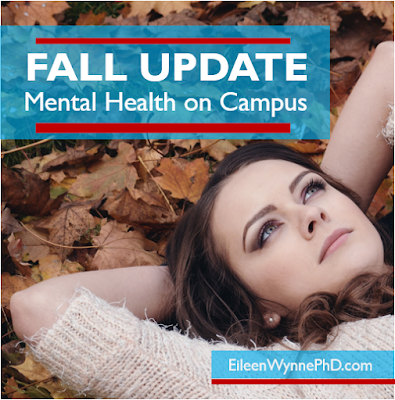FALL UPDATE: Mental Health on Campus
Our Friends and Neighbors
A recent report in the U.K. revealed that not only are universities unable to cope with the increasing numbers of students suffering from mental health conditions but also that students are killing themselves at an alarming (and increasing) rate. Another report from UniHealth stated that 82% of university students in the UK experience anxiety and stress and 1 in 5 have suicidal thoughts. In Canada, the situation is much the same. Recent results of the National College Health Assessment Survey (NCHA) demonstrate high rates of mental health issues in students. Thinktank Institute for Public Policy Research (IPPR) released a report showing that a record high 26% of students are utilizing counseling or mental health services, yet this still isn't meeting the need.
I chose to revisit this topic because these recent reports about college campuses in other countries are a reminder that across the United States, universities are facing a similar student mental health crisis. 85% of college student feel overwhelmed by their responsibilities and 30% report that stress negatively impacts academic performance. Things look even worst at the Post Grad level, Ph.D. Students have twice the risk of developing a psychiatric disorder. This issue needs our continued attention.
Identifying the Stressors
As I've noted in previous posts, the number of students reporting mental health concerns in the first year of college has grown dramatically over the last several years and continues to increase. Academic and financial pressures are crippling students and leading them to unprecedented rates of stress and anxiety. Many students say that the pressure to participate in activities and/or sports while also excelling academically can put them over the edge. In addition, young adults can be unprepared for the stresses of living away from families for the first time while managing school responsibilities and often jobs as well.
Universities are Taking Aim
Universities across the country are working to improve behavioral health services for students. UCLA has just launched a large-scale study of college freshman, called the Depression Grand Challenge, aimed at uncovering the causes of depression. As part of the initiative, the participating freshmen will receive depression screening to help uncover and treat mental health concerns early. Stanford is similarly screening incoming students for mental health problems with the aim of early diagnosis and treatment of issues. The University of Pennsylvania reconvened a Student Psychological Health and Welfare task force after a 2016 student suicide, the 14th since 2013. This group recommended expansion of I CARE training, and increasing the hours of their Counseling and Psychological Services hours, among other improvements.
There is Help
With all of the news from across the country, the United Kingdom, and Canada, it may seem like there is no good way to approach the issue. Below are several different options for students suffering from anxiety, depression, addiction, or other mental health issues.
Hotlines
Some universities have hotlines for students, but there are also national hotlines.Peer support groups & local support groups
Many universities have set up local peer groups that give students a stigma-free environment to discuss issues.University health & wellness centers
Many universities now provide counseling services.Therapy with licensed counselors, therapists, etc.Finding a local therapist can be a great weekly anchor, enabling students to discuss issues and plan interventions.
Online screening tools
(While these will not help you manage all the symptoms, they can help you to see if you have symptoms of depression)
Depression is the world's leading cause of disability, according to world health experts and it is believed that 800,000 people commit suicide annually. If you or a loved one is feeling distressed, call the National Suicide Prevention Lifeline. The crisis center provides free and confidential emotional support. If you are in crisis and need help, call this toll-free number, available 24 hours a day, every day: 1-800-273-TALK (8255). This service available to anyone. You may call for yourself or for someone you care about, and all calls are confidential. You can also visit the Lifeline’s website at http://www.suicidepreventionlifeline.org
If you are feeling anxious or depressed, I am available to help develop coping strategies that will put you on the path to feeling better. I work primarily with college students and young adults. Talking about your issues and developing an action plan can help you to deal with stress and anxiety in a healthier way.

